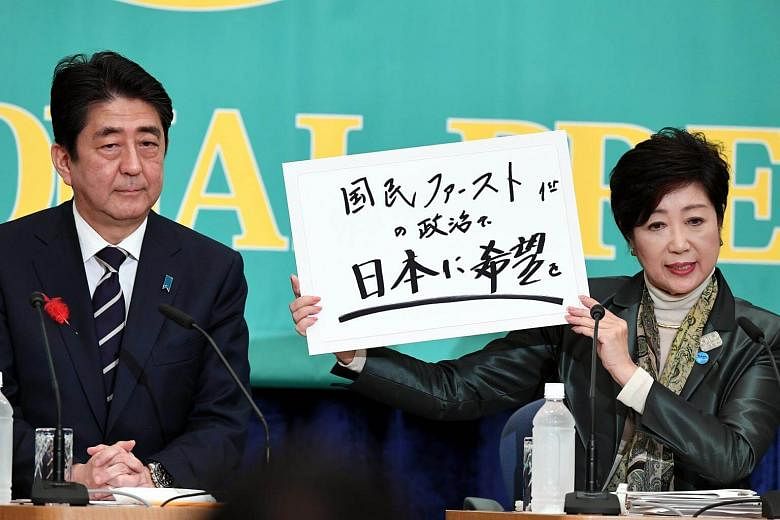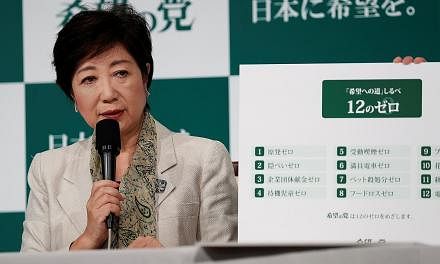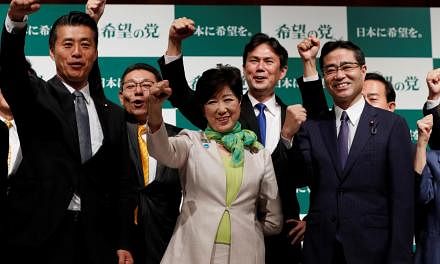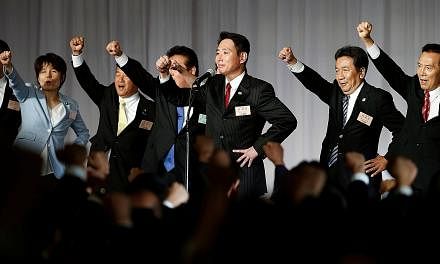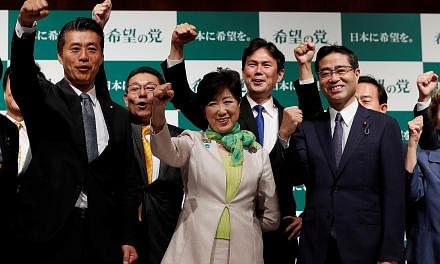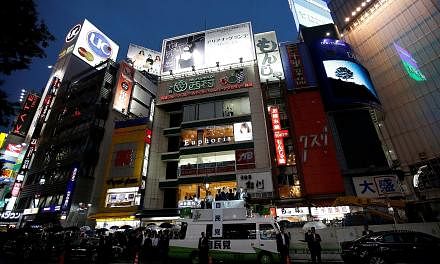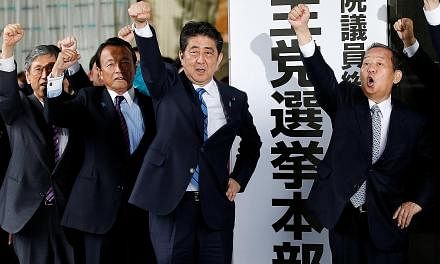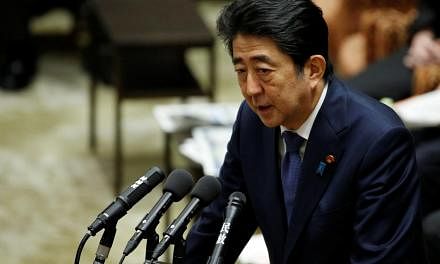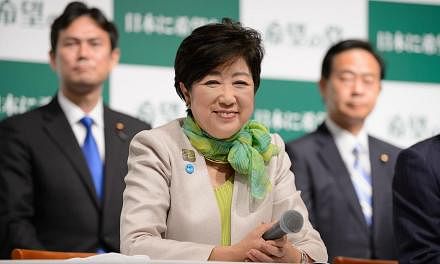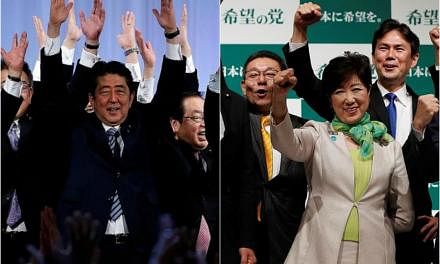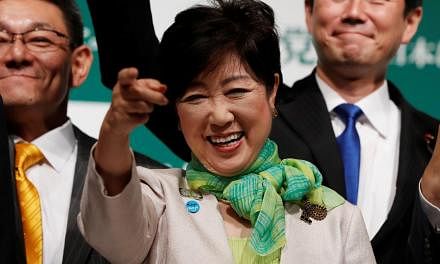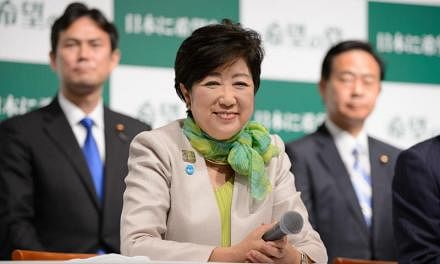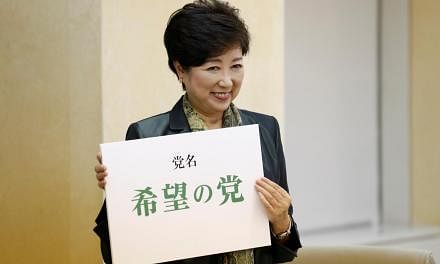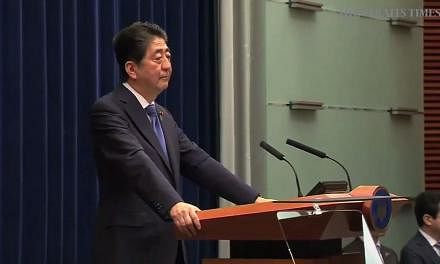TOKYO (BLOOMBERG) - As Prime Minister Shinzo Abe's Liberal Democratic Party (LDP) and Tokyo Governor Yuriko Koike's emergent Party of Hope (Kibo no To) shape up to contest a Japanese national election on Oct 22, the two conservative forces are staking out key points of difference on taxes and nuclear power.
While provocations from North Korea mean security issues will also weigh heavily on voters, popular concern about stagnant wages, strained household budgets and the country's swelling welfare burden are likely to keep the economy high on the agenda.
Mr Abe, who can point to an economic recovery that has already notched up six quarters of growth, looks set to emphasise prudence on going ahead with a sales tax hike and foresight in funnelling a big chunk of the revenue into education.
Ms Koike can counter that the last increase in the levy pushed Japan into recession and that it should be postponed again.
As campaigning for the election kicks off on Tuesday (Oct 10), here's a look at how the LDP, Party of Hope and Mr Abe's coalition partner, Komeito, compare on the economic platforms they have put forward over the past week.
SALES TAX
The LDP has vowed to go ahead with an increase in the sales tax rate by 2 percentage points to 10 per cent in October 2019. It has earmarked about half of the revenue for education and social spending, and the other half to help cover Japan's deficit.
Komeito supports the tax hike, but will push for reduced rates for certain items like food.
Ms Koike's party wants to freeze the tax rate at 8 per cent for the time being, citing the need to ensure the economic recovery continues. When the levy was last raised in 2014, from 5 per cent, consumption slumped and gross domestic product contracted for two quarters.
CORPORATE TAXES
Party of Hope wants to examine a potential tax on the cash reserves of large companies to funnel some of this money back into society. While big corporations have reported record profits during Mr Abe's time in government, they have been reluctant to put this money into wages and investment.
Mr Abe's deputy, Finance Minister Taro Aso, has repeatedly complained about companies piling up cash reserves and not investing. But the LDP has not put forward any plans to tax this money.
NUCLEAR POWER
The LDP sees it as an economic necessity to restart nuclear power plants that were shut down in the aftermath of the Fukushima meltdown in 2011, though it does seek to curb dependence on nuclear energy.
Komeito also supports some restarts for now, but wants to push harder to expand the use of other energy sources and it ultimately seeks to move away from nuclear power.
Party of Hope wants to eliminate nuclear from Japan's energy mix by 2030, chiefly out of concern for safety and the environment.
MONETARY POLICY
The Bank of Japan's (BOJ's) monetary policy, which was front and centre of Mr Abe's economic sales campaign when he came to power in December 2012, does not get any mention in the LDP's manifesto for the Oct 22 election. With the BOJ seemingly years away from its 2 per cent inflation target and its controversial stimulus programme still in place, Mr Abe appears intent on steering clear of the area.
Party of Hope has signalled the need to exit from the current policy, but gradually and not yet. This may allow Ms Koike to tap into disaffection with the BOJ, particularly the central bank's negative rate policy, while also soothing any worries about an abrupt change that could shock the financial system. In an interview, Ms Koike said that a sudden change in the BOJ's policy would be "not good", and that the exit strategy "must be conducted with great care".
FISCAL CONSOLIDATION
The LDP and Party of Hope both support working towards a primary balance surplus, a key yardstick for bringing debt under control that weighs total government spending, minus interest payments on borrowing, against tax receipts.
But the LDP has let its goal slip of achieving this by fiscal year 2020 and has not provided a new time frame. Party of Hope said it will set a more realistic timetable, but did not offer any date.
EDUCATION AND INCOME SUPPORT
The LDP aims to use the sales tax bump to fund free pre-school for children aged three to five, and free childcare for those aged below two from low-income families.
Ms Koike's Party of Hope has no counter to this offer, but has flagged the idea of introducing a "basic income" to help the poor, though it did not provide any details.
SLOGONOMICS
Not to be outdone by the Prime Minister's "Abenomics" slogan, Ms Koike's party used "Yurinomics" to describe its economic platform.
